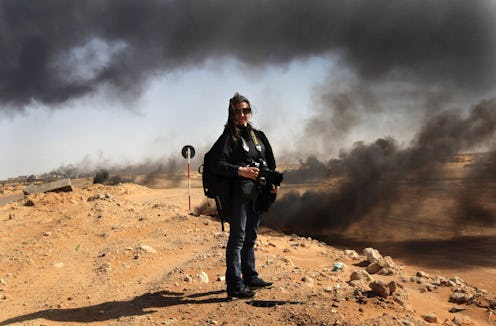Books
Are You Ready To Read A Memoir That'll Change You?
Lynsey Addario is no stranger to conflict — as a war photographer working freelance and also for institutions as well-established as The New York Times, Addario has fought her way to the front lines of war zones across the Middle East and North Africa. Addario has spent weeks under a chador capturing the lives of women struggling day by day under the fundamentalist rule of the Taliban in Afghanistan, and documented the combat deaths of American soldiers. She has survived two kidnappings and been shot at, groped, cheated on, punched in the face, and threatened with death all in the line of duty.
As a mother, a writer, and a woman, Addario has documented her story in an extraordinary new memoir, It's What I Do: A Photographer’s Life of Love and War (Penguin Press) — and she's done it while preparing to head back into the fray, determined to bare witness to the world's most brutal atrocities.
Although the adventures and anecdotes fly fast and furious throughout the text, Addario's new book is much more than the story of one young woman's journey from passionate amateur to MacArthur "Genius Grant" winner. Instead, it is a poignant reminder of the ongoing struggles faced by women in the workplace; of the psychological pressures and physical threats; of the emotional sacrifices and personal struggles faced by women who follow their hearts.
“Something I had perceived until that moment as a simple means of capturing pretty scenes became something altogether different: It was a way to tell a story. It was the marriage of travel and foreign cultures and curiosity and photography. It was photojournalism.”
Addario's memoir has the raw, intimate ability to inspire young women and engage young men, and the probing insight necessary to remind each and every one of us of the hurdles we still face in creating a more equal world. Like Addario's photographs obtained at great personal risk and published to tremendous effect, It's What I Do is the one of those rare books that actually has the power to make us all better people.
Throughout It's What I Do, Addario documents not only her harrowing brushes with death, but also her more intimate, internal conflicts — her early struggle for legitimacy and respect within the male-dominated arena of war reporting, the overpowering desire to bare witness regardless of the personal costs, and ongoing confrontations with the unique terrors facing a woman in a war zone.
Addario speaks candidly about the gnawing fear of rape, the trials of peeing in captivity without a penis, and the boyfriend she took back after his admissions of infidelity because coming home to an empty apartment after months on the front lines was simply to painful to contemplate. Although at times the prose is perfunctory and we're hurried along into self-reflection when the vehicle better serves her purpose, a relentless honesty and broad focus anchor Addario's book at the nexus of the personal and the political.
Addario is at her best as she relives the moments before she and three colleagues were captured while working at the front lines in Lybia, speaking candidly about ignoring her intuition in the hours leading up to her capture, and the ways in which her own awareness of gender caused her to remain silent when every fiber of her being demanded she speak up.
“I didn’t want to be the cowardly photographer or the terrified girl who prevented the men from doing their work.”
Addadrio's book is not only a powerful reminder of the incredible potential of women to make change in this world, but also an honest recognition of the very real struggles foisted upon all of us by gender, circumstance, and the challenges we choose to take on. All too often we honor the accomplishments of high-achieving women without acknowledging the sacrifices, and Addario's memoir offers a rare glimpse at the the painful path to fulfillment faced by so many brave individuals.
With a personal approach and a political message, Addario's book forces us to confront the limits of our own power and the struggles we must share together if we want to see future generations of young women and men live out their dreams with passion, integrity, and agency.
Image: Getty Images
